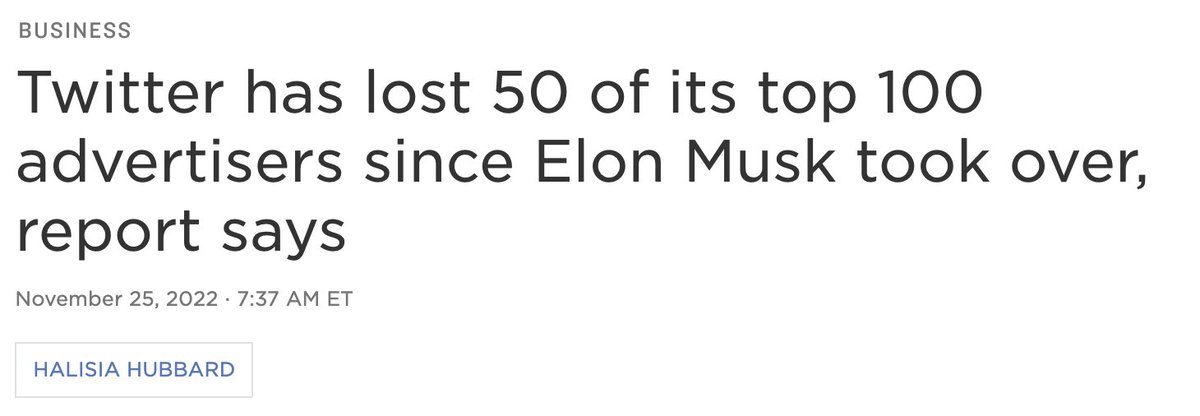
My impressions of what Musk is doing with Twitter, and his likely chances of success, have changed as I’ve seen the past month play out.
Short version: Despite the chaos, the advantages of his position are becoming clear (thread)
Short version: Despite the chaos, the advantages of his position are becoming clear (thread)
As I said weeks ago, so long as Twitter depended on ads for the vast majority of its revenue, Elon couldn’t truly run the company as he wished. He’d have to bow and scrape to them. And advertisers are responsive to activist pressure. So his hands are tied, right? 

But after an initial attempt of questionable seriousness to placate advertisers, he apparently decided, screw it, let them leave. And many have. (I assume some others joined but not anywhere near enough to make up the shortfall)
npr.org/2022/11/25/113…
npr.org/2022/11/25/113…

Losing tons of revenue is bad.
But: Musk also drastically cut expenses by either laying off or getting resignations from most of Twitter’s staff. And despite #RIPTwitter the site hasn’t collapsed and remains heavily used.
But: Musk also drastically cut expenses by either laying off or getting resignations from most of Twitter’s staff. And despite #RIPTwitter the site hasn’t collapsed and remains heavily used.
Now, because of Twitter’s debt load, he still has to solve the revenue problem. Twitter Blue won’t do it.
He also still faces existential threats. Activists will voice hate speech concerns to the Apple & Google app stores. And there’s the EU.

He also still faces existential threats. Activists will voice hate speech concerns to the Apple & Google app stores. And there’s the EU.


But he has some enormous advantages: incumbency, and the product itself.
First, incumbency is powerful. Will a critical mass of people actually leave Twitter? It increasingly seems the answer is no.
First, incumbency is powerful. Will a critical mass of people actually leave Twitter? It increasingly seems the answer is no.
I have (I presume) mostly liberal followers, my follower count has dropped ~3% since Elon’s takeover (could be my own bad tweets).
That's not catastrophic. If that rate of decline keeps up, it's bad. But that could be low-hanging fruit.
That's not catastrophic. If that rate of decline keeps up, it's bad. But that could be low-hanging fruit.
I’m reminded of the anti-Substack campaign re: anti-trans content. Some big names left, most didn’t, and more keep joining, including many on the left. That’s because Substack remains the best platform for newsletter convenience & reach
And if you’ve explored the alternatives, you know Twitter remains the best platform for real-time short-form text broadcasting.
So if some power users quit Twitter out of principle but their reach and influence plummet, many will return
So if some power users quit Twitter out of principle but their reach and influence plummet, many will return
It certainly seems like the vast majority of liberal and left users have stuck around despite, well, everything. That’s because if you join another much tinier platform you’re relegating yourself to a niche. (As conservatives found.)
Still, a mass exodus could happen. It would have to be precipitated by some far more appalling thing to create a cascade of departures among even casual liberal-leaning users. Something that makes staying on seem morally disreputable
That’s an important constraint on Elon’s actions. He does need to avoid turning Twitter into a much more expensive Gab.
But so far he’s pushed the boundaries a fair bit and, well, you’re still here, aren’t you?
But so far he’s pushed the boundaries a fair bit and, well, you’re still here, aren’t you?
Addendum: Getting many responses to this thread pointing out I didn’t solve Twitter’s revenue problem, which is totally true! I don’t know how to solve it or if Musk will be able to.
But as long as he holds onto the userbase he will be able to try some stuff.
But as long as he holds onto the userbase he will be able to try some stuff.
And @joshtpm makes several good points here, but rather than the Trump presidency I'd think of the Trump businesses. Constant blunders, bankruptcy, apparent mismanagement but always a way to keep things going. And Elon is a better businessman than Trump
https://twitter.com/joshtpm/status/1596938352145879041
• • •
Missing some Tweet in this thread? You can try to
force a refresh







